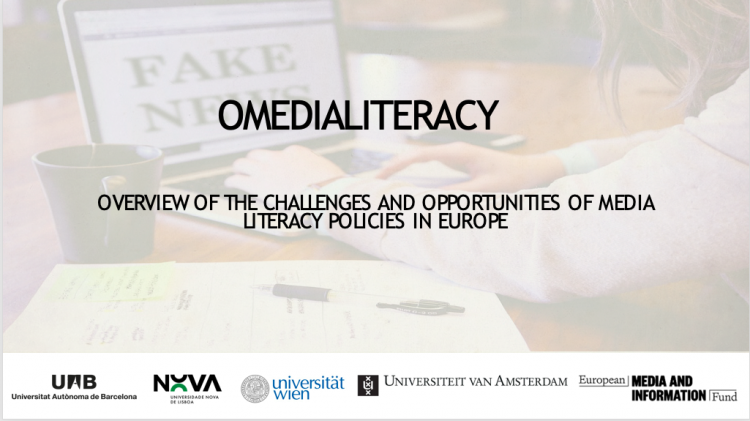The Gabinete de Comunicación y Educación (UAB) is working on the project ‘Omedialiteracy: Overview of the challenges and opportunities of media literacy in Europe’. This is a project led by the UAB, together with the University of Lisbon, the University of Vienna and the University of Amsterdam, which aims to identify existing knowledge on the effects of misinformation in Europe, compare current policies on media literacy in member countries and identify good practices to overcome misinformation.
This one-year project is funded by the European Media and Information Foundation (EMIF), which aims to support initiatives related to information verification and media literacy, as well as research projects to address the phenomenon of misinformation in Europe.
Media literacy is one of the main lines of research of the Gabinete de Comunicación y Educación. This project will work on a literature review to know the state of disinformation in Europe and how to combat it through media literacy, the creation of a comparative mapping of policies on disinformation in member countries and the identification of good practices and the elaboration of a final report.
On 2 October, Santiago Tejedor, Cristina Pulido and Maria José Recoder, members of the Cabinet and the project, participated in the ‘EMIF Annual Event: Funding the Fight Against Disinformation‘, held in Lisbon. The event brought together different media organisations, researchers, NGOs and policy makers from all over Europe to discuss the challenges and opportunities of fighting against disinformation in Europe.
The Gabinete de Comunicación y de Educación is a consolidated group specialised in scientific research and dissemination, which belongs to the Department of Journalism and Communication Sciences of the UAB. Recognised by AGAUR (Agència de Gestió d’Ajuts Universitaris i de Recerca) of the Generalitat de Catalunya as a Consolidated Research Group on the basis of its trajectory, projection and development, it develops projects and research in the field of convergence between communication and education. Since its creation, it has developed initiatives aimed at integrating, with awareness and freedom, communication technologies in the so-called global or knowledge society. Under the direction of Santiago Tejedor, the Office organises different master’s degrees, such as the Master’s Degree in Travel Journalism (on-site and online), the Master’s Degree in Communication and Education, the Master’s Degree in Environmental Communication and the Master’s Degree in Political and Electoral Communication Management. The group has a wide and varied collection of publications, in the form of scientific articles, books and book chapters, and other works, which is constantly being renewed. It also has a laboratory for teaching innovation projects, transfer and new formats that are conceived and developed from a perspective based on creativity and multidisciplinary work. Every year, the Cabinet organises an academic expedition that travels the world with students from different universities and degrees. This is the Tahina-Can Expedition, which has been awarded as the best educational project in Spain. It also has the portal Tu Aventura, the educational platform InfoEDU and the newsgames and science project Reporteros de la Ciencia.





